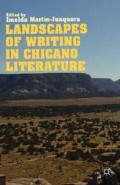Abstract
Anaya’s literary corpus is a sustained celebration of hybridity and convergence, as well as a deconstruction of racial/cultural essentialism. Anaya is fully aware of the tragic destiny of the American Indian after the arrival of the European, and he recounts that tragedy once again in his writings, especially the fate of the Pueblos in the Southwest, for the past cannot be denied, much less forgotten. However, Anaya is very conscious of the fact that the past cannot be changed, and also of the fact that we can all learn from it. And I think that is precisely one of the overarching themes that unify Anaya’s fiction, the desire to draw lessons from the past that can help us understand, and change the present. In the closing lines of Serafina’s Stories, Anaya writes, “Perhaps by studying and understanding the history surrounding the 1680 Pueblo Indian Revolt we learn not to place blame, but how we can live together in mutual respect. As a wise man said, we cannot change history, but we can learn from it” (202).
Access this chapter
Tax calculation will be finalised at checkout
Purchases are for personal use only
Preview
Unable to display preview. Download preview PDF.
References
Alurista. “Myth, Identity and Struggle in Three Chicano Novels: Aztlan… Anaya, Méndez and Acosta” in Anaya, Rudolfo and Francisco Lomelí. Aztlán: Essays on the Chicano Homeland. Albuquerque: El Norte Publications (UNM), 1989. 219–229. Print.
Anaya, Rudolfo. Bless Me, Última. Berkeley, CA: Quinto Sol Publicaciones, 1972. Print.
Anaya, Rudolfo. Tortuga. Albuquerque, NM: University of New Mexico Press, 1979. Print.
Anaya, Rudolfo. Alburquerque. Albuquerque: University of New Mexico Press, 1992. Print
Anaya, Rudolfo. Serafina’s Stories. Albuquerque, NM: University of New Mexico Press, 2004. Print.
Anaya, Rudolfo and F. Lomelí. Aztlán: A Homeland without Boundaries. Albuquerque, NM: University of New Mexico Press, 1989. Print.
Anzaldúa, Gloria. “The Homeland, Aztlán/El Otro México.” in Aztlán: A Homeland without Boundaries. Ed. Rudolfo Anaya & Francisco Lomelí, 191–204. Print.
González, César, Ed. The Anaya Reader. New York: Warner Books, 1995.
Mann, Thomas. “The Making of the Magic Mountain.” Atlantic Monthly 191 (January 1953): 41–54.
Mann, Thomas. The Magic Mountain. New York: Random House, 2005. Print.
Márquez, Antonio. “The Achievement of Rudolfo A. Anaya.” in The Magic of Words: Rudolfo A. Anaya and His Writings. Ed. Paul Vassallo. Albuquerque, NM: University of New Mexico Press, 1982.33–52. Print.
Author information
Authors and Affiliations
Editor information
Copyright information
© 2013 Imelda Martín-Junquera
About this chapter
Cite this chapter
Broncano, M. (2013). “We Are All Serafina’s Children”: Racial Landscapes in Rudolfo Anaya. In: Martín-Junquera, I. (eds) Landscapes of Writing in Chicano Literature. Palgrave Macmillan, New York. https://doi.org/10.1057/9781137353450_11
Download citation
DOI: https://doi.org/10.1057/9781137353450_11
Publisher Name: Palgrave Macmillan, New York
Print ISBN: 978-1-349-45125-8
Online ISBN: 978-1-137-35345-0
eBook Packages: Palgrave Literature CollectionLiterature, Cultural and Media Studies (R0)

